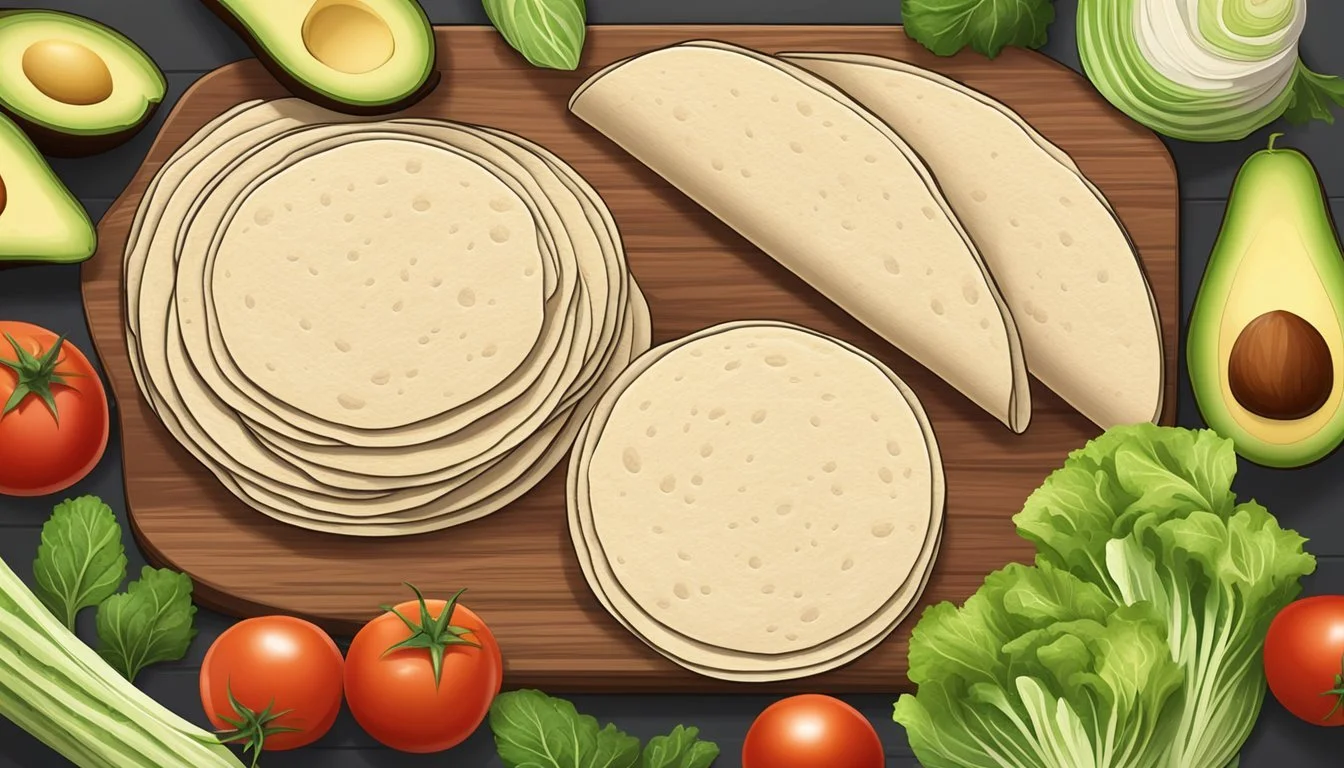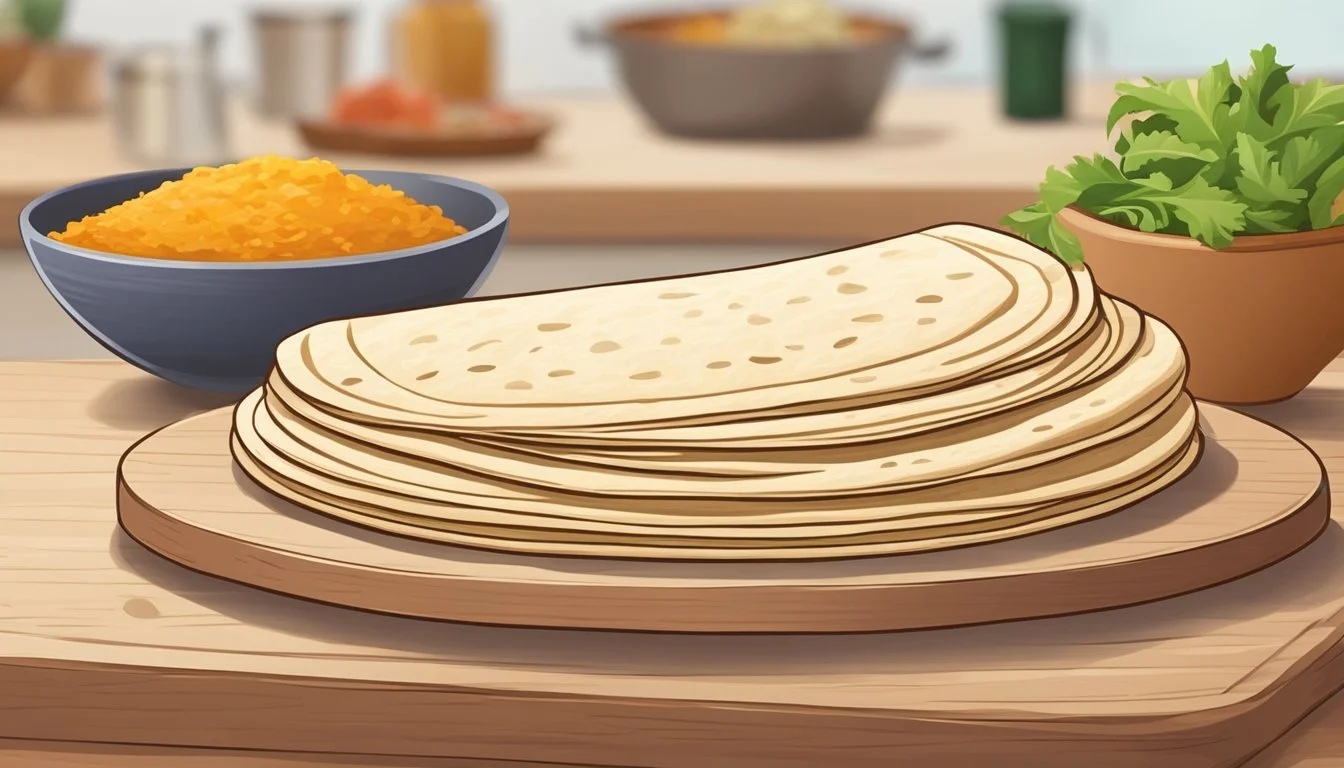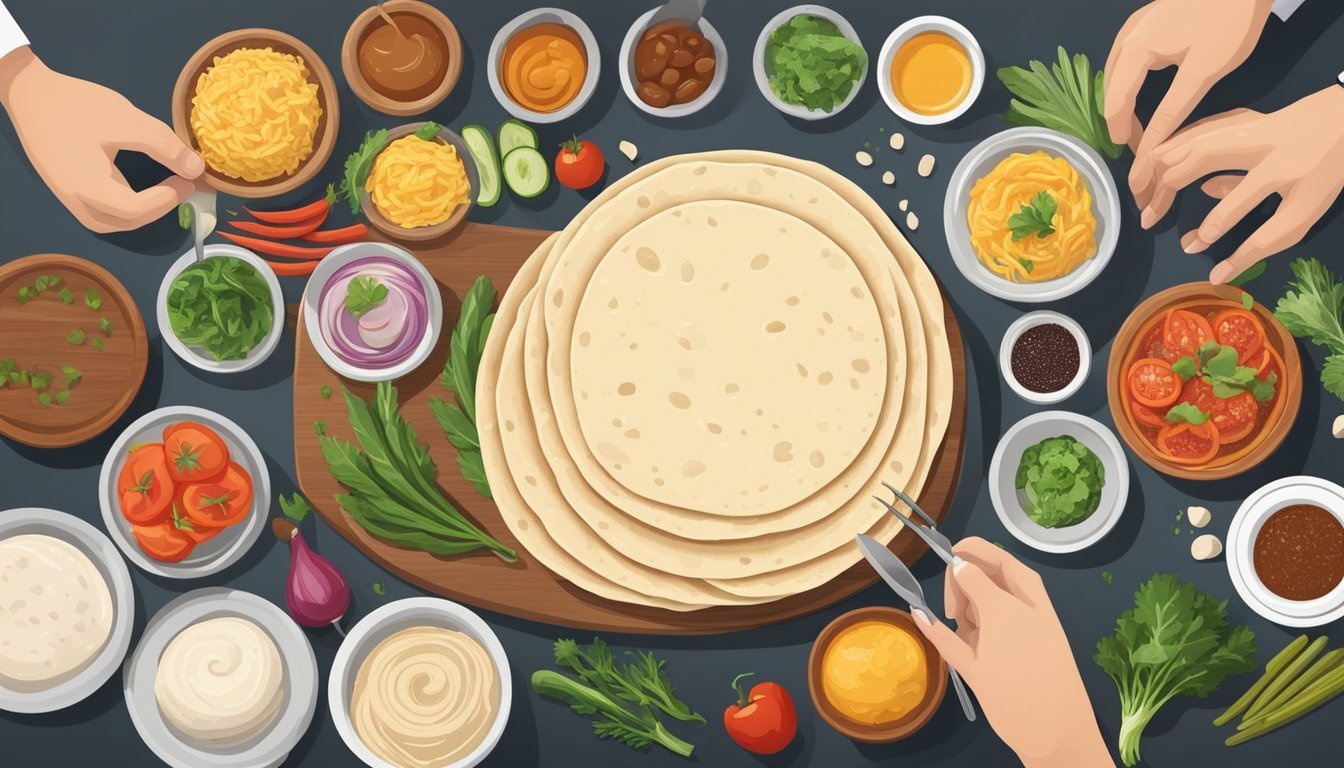Flour Tortilla Substitutes
Top Alternatives for Your Wraps
In the quest for healthier eating habits and dietary inclusivity, many are turning away from traditional flour tortillas in search of alternative options. With food allergies and lifestyle choices prompting a shift in consumer behavior, the market is responding with a variety of substitutes. These range from low-carb options suitable for ketogenic diets to gluten-free and grain-free alternatives that cater to those with sensitivities or celiac disease.
Such alternatives include vegetable-based wraps, such as those made from cauliflower, which offer a nutrient-dense profile while keeping carbohydrate content low. Other creative options entail using leafy greens like collard greens as a natural wrap, marrying the concept of a tortilla with the benefits of raw vegetables. Additionally, various flour substitutes derived from almonds, cassava, and coconut provide distinct flavors and textures, allowing individuals to enjoy their favorite wraps without straying from their nutritional goals.
Manufacturers and home cooks alike are experimenting with different seeds and roots to produce tortillas that not only accommodate dietary restrictions but also add a new dimension to dishes. The focus on health-conscious substitutes has made it easier for consumers to maintain their dietary preferences without sacrificing the enjoyment of dishes traditionally reliant on flour tortillas. Whether seeking to reduce carbohydrates, avoid gluten, or simply introduce variety into meals, the array of available tortilla substitutes continues to expand.
Understanding Flour Tortillas
Flour tortillas are a staple in Mexican cuisine, offering a versatile base for a variety of dishes. They contain gluten, which gives them their elasticity and soft texture.
Ingredients and Nutritional Value
Flour tortillas are primarily made from wheat flour, which provides gluten, a protein that allows the tortillas to be stretched and rolled without tearing. This gluten content, however, means that they are not suitable for those with gluten intolerances or celiac disease. Typically, a standard flour tortilla also contains water, salt, fat, and sometimes a leavening agent.
A typical flour tortilla contains the following nutritional values:
Carbohydrates: The primary nutrient in flour tortillas, necessary for energy.
Protein: Provides some level of protein, although not as much as other sources like meat or legumes.
Fat: Comes from the oil or shortening used in the dough, contributing to the tortilla's flavor and texture.
Fiber: Contains a small amount of dietary fiber, but less than whole grain or corn tortillas.
Minerals & Vitamins: Offers various minerals and vitamins but in smaller quantities compared to other food items, like whole grains.
Common Uses in Cuisine
Flour tortillas serve as the foundation for many Mexican and Tex-Mex dishes. They are commonly used in:
Tacos: Soft tacos with a variety of fillings.
Burritos: Larger tortillas capable of holding an array of ingredients in a tightly wrapped package.
Mexican Food: A ubiquitous component across the spectrum of Mexican cuisine.
Mexican food enthusiasts appreciate flour tortillas for their soft texture and mild flavor, which complements a wide range of ingredients from savory meats to fresh vegetables.
Why Seek Flour Tortilla Substitutes?
Individuals often search for substitutes for flour tortillas due to health concerns, dietary restrictions, and personal nutrition goals. Identifying suitable alternatives can aid in maintaining a well-balanced diet without compromising taste and variety.
Dietary Restrictions and Allergies
Flour tortillas are typically made from wheat, which contains gluten. This can pose a serious issue for individuals with celiac disease or gluten sensitivity, making gluten-free alternatives a necessity. Allergies to other ingredients in flour tortillas, like soy or dairy, also drive the need for substituting these common wraps.
Health and Nutrition Considerations
Those focused on improving their overall health may opt for tortilla substitutes to enhance the nutritional value of their meals. Substitutes often contain more fiber and less processed ingredients, which can contribute to heart health and better digestion. Additionally, ingredients like refined flour in traditional tortillas can impact blood sugar levels, which is a concerning factor for people managing diabetes.
Weight Loss and Low-Carb Diets
For individuals pursuing weight loss or following a low-carb, keto, or paleo diet, finding alternatives to flour tortillas is crucial. Flour tortillas can be high in calories and net carbs, which might hinder the progress of these specific dietary plans. Substitutes that are lower in carbohydrates offer a way to enjoy similar dishes, like wraps or tacos, without disrupting ketosis or caloric goals.
Alternatives to Wheat-Based Tortillas
Exploring flour tortilla alternatives can enhance nutrition and cater to dietary needs. From corn-based to leafy greens, and homemade options, each substitute offers distinct health benefits and flavors.
Corn Tortillas and Their Benefits
Corn tortillas stand out as a traditional and gluten-free alternative to wheat tortillas. They are made from masa harina, a dough derived from ground nixtamalized corn. The benefits of corn tortillas include:
Lower in calories: Generally, they have fewer calories than flour tortillas, making them a weight-friendly choice.
High in fiber: Corn tortillas provide more dietary fiber which aids in digestion.
Grain-Free and Plant-Based Options
Individuals seeking grain-free or vegan substitutes find numerous plant-based options that are both nutritious and satisfying. Here are some prominent alternatives:
Spinach, Kale, and Collard Greens: Leafy greens can serve as wraps for those seeking a low-carb, high-nutrient option.
Nori Sheets: Rich in iodine and often seen in Japanese cuisine, offer a unique flavor profile.
Homemade Healthy Tortilla Recipes
Creating tortillas at home allows for customization to dietary preferences and ensures the use of whole, unprocessed ingredients. A popular and simple grain-free recipe involves:
Ingredients:
Tapioca flour
Water
Egg white (optional for added structure)
Salt
Method:
Mix the flours, water, and salt to form a dough.
Divide and roll out the dough into individual tortillas.
Cook each tortilla in a heated skillet with a drizzle of avocado oil until each side is browned.
Innovative Flour Tortilla Alternatives
Exploring flour tortilla substitutes offers a variety of health benefits such as reduced carb intake, and incorporation of more whole food ingredients. The following alternatives cater to dietary restrictions like gluten intolerance and carb-conscious eating.
Leafy Greens as Wraps
One can turn to nature's very own leafy greens for a nutritious twist. Large leafy vegetables such as romaine lettuce, collard greens, and spinach can cradle ingredients effectively. For instance, collard greens make a sturdy wrap, while spinach leaves are softer but packed with protein and vitamins.
Seaweed and Nori Sheets
Nori sheets, typically utilized in sushi making, are exceptional gluten-free flour tortilla substitutes. They are crafted from roasted seaweed and boast a rich profile of vitamins and minerals. Nori can be used to encase a variety of fillings for those seeking a low-carb solution.
Alternative Flour Wraps
In the realm of alternative flours, one can find spinach wraps and almond flour tortillas which offer diverse flavors and nutritional profiles. Almond flour tortillas are particularly suitable for gluten-sensitive individuals and those monitoring their carbohydrate intake.
Commercial Low-Carb and Gluten-Free Wraps
For those who favor convenience, store-bought tortillas made from gluten-free and low-carb ingredients such as coconut wraps and tortillas made from other whole grains are readily available. These alternatives often mimic the pliability of traditional tortillas while serving as a beneficial choice for health-conscious consumers.
Preparing and Cooking Tortilla Substitutes
When preparing and cooking tortilla substitutes, one must consider their unique properties such as cook time and texture. Each substitute requires specific handling to achieve the best results.
Tips for Using Different Substitutes
When using nori sheets, they require no cooking and can be used straight from the package, providing a crispy texture. Lettuce wraps, on the other hand, only need a thorough wash and can be used raw, offering a crunchy and refreshing bite.
For substitutes like cloud bread, which require a mixture of eggs, cream cheese, and baking powder, one should whip the egg whites to the right consistency to ensure that airy texture. Cloud bread is baked for approximately 30 minutes at 300°F.
Tosai/dosa involves a batter prepared with rice and lentils, fermented overnight, and then cooked on a griddle like a crepe for a few minutes on each side until crisp.
Cook Time and Prep Considerations
Substitute Preparation Time Cook Time Total Time Cloud Bread 10 min 30 min 40 min Tosai/Dosa Overnight + 10 min 2 min per side Varies Nori Sheets N/A N/A N/A Lettuce Wraps 5 min N/A 5 min
While nori sheets and lettuce wraps have minimal prep time, one needs to allocate more time for making cloud bread and tosai/dosa due to their cooking requirements. In terms of texture, nori sheets are thin and crisp, lettuce wraps are soft and moisture-rich, cloud bread is fluffy and light, and tosai/dosa is usually thin and crispy on the edges.
Storing and Reheating Instructions
Cloud bread should be stored at room temperature in an airtight container for up to three days or frozen for longer periods. To reheat, a toaster oven or a regular oven will suffice to maintain its texture, but one should avoid the microwave as it can make it chewy.
Dosa batter can be refrigerated for several days, and cooked dosas can be stored in the fridge and reheated on a pan for best results. Nori sheets stay fresh when kept in a dry, cool place, and are not suitable for reheating. Lettuce wraps are best if they're prepared fresh, but leaves can be stored in the fridge and patted dry before use.
Adapting Meals for Substitutes
When exploring alternatives to flour tortillas, it’s important to consider how substitutes will interact with traditional Mexican flavors and fillings for dishes like wraps, tacos, and burritos. Meal planning can become an exciting exploration of alternative ingredients that maintain or enhance the cuisine's appeal.
Wraps, Tacos, and Burritos
Alternatives such as pita bread, nori sheets, and grain-free tortillas can transform the usual wraps, tacos, and burritos into novel dining experiences. Pita offers a neutral canvas that picks up the robust flavors of Mexican cuisine without competing with them. Nori sheets, typically used in sushi, provide an umami-rich and gluten-free alternative, mingling well with lighter fillings like fish or vegetables. Grain-free tortillas, often made from almond flour, cater to dietary restrictions while still delivering a satisfying, pliable vessel for any type of taco or burrito filling.
One must consider the texture and flavors of these substitutes as they can affect the final dish. The alternatives may not absorb sauces the same way as traditional tortillas, possibly leading to a less messy eating experience. In recipes, adapt spice levels and sauce amounts to account for the differences in absorbency and flavor profile of the substitute used.
Other Creative Food Pairings
While Mexican cuisine is a common reference point, flour tortilla substitutes can be integrated into a variety of meal types. For instance, corn flour can replace masa harina in cornbread, adding a slightly sweeter taste, or in corn pancakes, offering a delicate flavor and fluffy texture. Cauliflower tortillas elevate health-focused meals, pairing seamlessly with light, fresh fillings like grilled chicken or mixed greens.
It is key to balance the substitute's inherent flavors and textures with the accompanying ingredients. When using substitutes like cornmeal in dough-like recipes, expect a grainier texture compared to masa harina, which may add a rustic feel to the dish without overwhelming it. Experimentation with ingredients such as bell peppers in place of tortillas can lead to refreshing and strikingly colorful dishes, moving beyond the expected to unveil a new realm of possibilities in wrap and taco cuisine.





